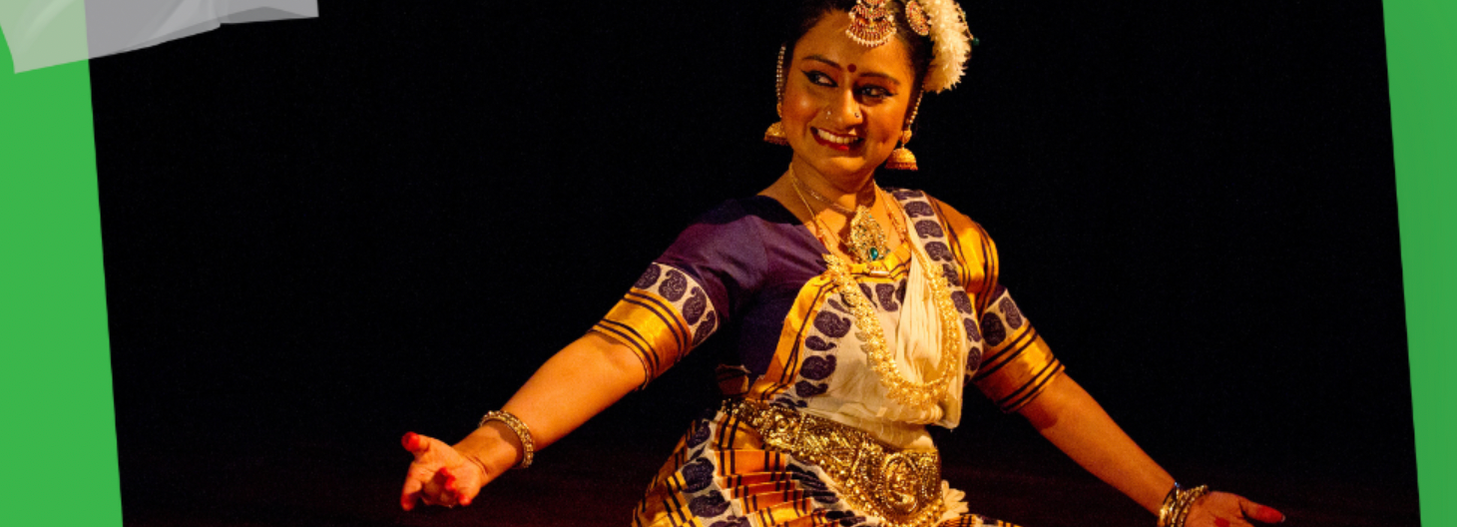Sean Burnett Dugdale-Martin
Last weekend, I attended a mask workshop by Jacob Rajan of Indian Ink fame as he gave a public lesson on Balinese masks. Rajan iterated the concept that it is more common in Western performances to focus the movement and energy into the chest and the head, but it is a more Eastern approach to control the focus into all extremities of the body, e.g. the hands, fingers, feet and toes. The style of dance in Ātete | Resistance | ചെറുത്തുനില്പ് reminds me of this concept as the precision at which Prameela Unni performs her dances gives me the impression that even though she makes it look effortless, she is in fact working harder than I ever have. She is a talented performer; she brings discipline and serenity to a dance of monumental importance. She floats between her movements with decisiveness and uses every extremity with precision and grace. No finger or foot out of place. The style of dance comes with a rich history, and in the calculated tableaus the body creates during it, gives a distinct impression of a literal storyline, while also seamlessly guiding into more evocative and emotional movements in the same dance.
Ātete | Resistance | ചെറുത്തുനില്പ് is an articulate and impressive dance show that leads us through its multiple sections. Each section has a core concept that has been elaborated on through dance. One particular section near the beginning of the piece is titled “Yakshi” which the programme elaborates on: Yakshi stories could be considered a cultural equivalent of female vampire stories, and in folklore they centre around women luring men with their beauty and then killing them and drinking their blood. Prameela Unna challenges the mythical perspective on Yakshi and criticises it as a form of patriarchal oppression on women who did not adhere to societal rules. Each section of Ātete | Resistance | ചെറുത്തുനില്പ് comes with a critical lens and a large problem. Other such issues that are dealt with include gender violence in displaced people because of climate change.
The decision to have the piece rooted in large, dangerously consequential concepts to the larger state of humanity and yet present it as a dance show saves it from becoming too heavy. To engage with such concepts in a more spoken-word format can become daunting and heavy for audiences, having to constantly work hard to imagine the intersectionality of climate change and displacement in other countries, but by presenting the ideas as a movement piece that is more evocative than directly informational, it means we feel much more without having to say much at all.
My main criticism for the piece lies in the first section of the dance, at the start of the show, where Prameela Unna vocally interjects during the dance to punctuate a societal unfairness upon women. Making pointed comments about how you are criticised if you cover up or don’t as a woman. This is a concise way of outlining the theme of the show, but this is also the only point where Prameela Unna speaks. I wonder if it can be done without words and be more cohesive with the rest of the show. As I write, my mind wanders to the possibility that this is an allusion to female voicelessness but constant movement regardless. An impactful thematic undercurrent that keeps me thinking for days after!
Ātete | Resistance | ചെറുത്തുനില്പ് is part of the TAHI Festival at BATS and tonight is it’s final night, find more information here.






